Earlier this year, Knox Shelton became executive director of Indie Memphis after the departure of former director Ryan Watt. Preparations for the 24th edition of the film festival, which will run from October 20-25, are well underway, but Shelton took a few hours out of his busy schedule to watch a movie he’s never seen before: Inherent Vice (2014, available at Black Lodge). Our conversations have been edited for length and clarity.
Chris McCoy: What do you know about Inherent Vice?
Knox Shelton: I know that it is a film by Paul Thomas Anderson, adapted from a novel by Thomas Pynchon, starring Joaquin Phoenix, Reese Witherspoon, Josh Brolin, Owen Wilson, a ton of other pretty well-known actors and actresses.
CM: Why did you pick this movie?
KS: One, it’s been on my watch list for a really long time. I’ve probably not watched it for the same reason that I’ve owned a copy of Gravity’s Rainbow for I don’t know for how many years, but I’ve never read it. And I told myself that I would read the Pynchon novel before watching the movie, and that’s probably not going to happen. So, it’s time to just watch this movie. And we’ve got the festival upcoming, so I was trying to find some great connections there. One of our films this year, C’mon C’mon, is starring Joaquin Phoenix, so I thought this would be a great film to watch.
150 minutes later…
CM: OK! Knox Shelton, you are now someone who has seen Inherent Vice. What did you think?
KS: I thought it was really good. It was really funny, which I don’t think I expected going into a Paul Thomas Anderson movie, given his most recent films. It’s definitely a movie, I think, to watch a few more times, to let it all sink in. I was immediately drawn into loving the dynamics between Bigfoot and Sportello. They were a really fun little pair.
CM: I have watched it a whole bunch of times and I see new stuff in it every time. Paul Thomas Anderson took the novel and did the whole thing in a screenplay format, and then edited it down into this movie. What really struck me this time was that this is Pynchon doing hard-boiled detective language. If you think about it, The Big Sleep and stuff like that has very flowery dialogue. But you don’t think of it as flowery, ’cause it’s being growled by Humphrey Bogart. That’s what I was really listening to this time, the musicality of the dialogue — really throughout the whole thing. Everybody kind of talks alike, but it’s just so beautiful that you don’t care.
KS: You’ve got this Big Lebowski element, where you’ve got the stoner detective. But the dialogue is so much more elevated, and of course other elements of the film, I think, are a little more elevated too. It’s really artistic and delightful throughout.
CM: I think you’re right that there is a straight line from The Big Lebowski to this movie. When this movie came out, a lot of people did not get it. I had a conversation with Craig Brewer where I was like, “Oh my God, have you seen this?” And he was just like, “Meh.” I fell in love with it immediately. But he was like, “People are whispering. I can’t understand what’s going on. They’re talking about characters who are never seen on the screen.” Well, yeah! But it really works for me. I have a real emotional attachment, I guess, to this movie.
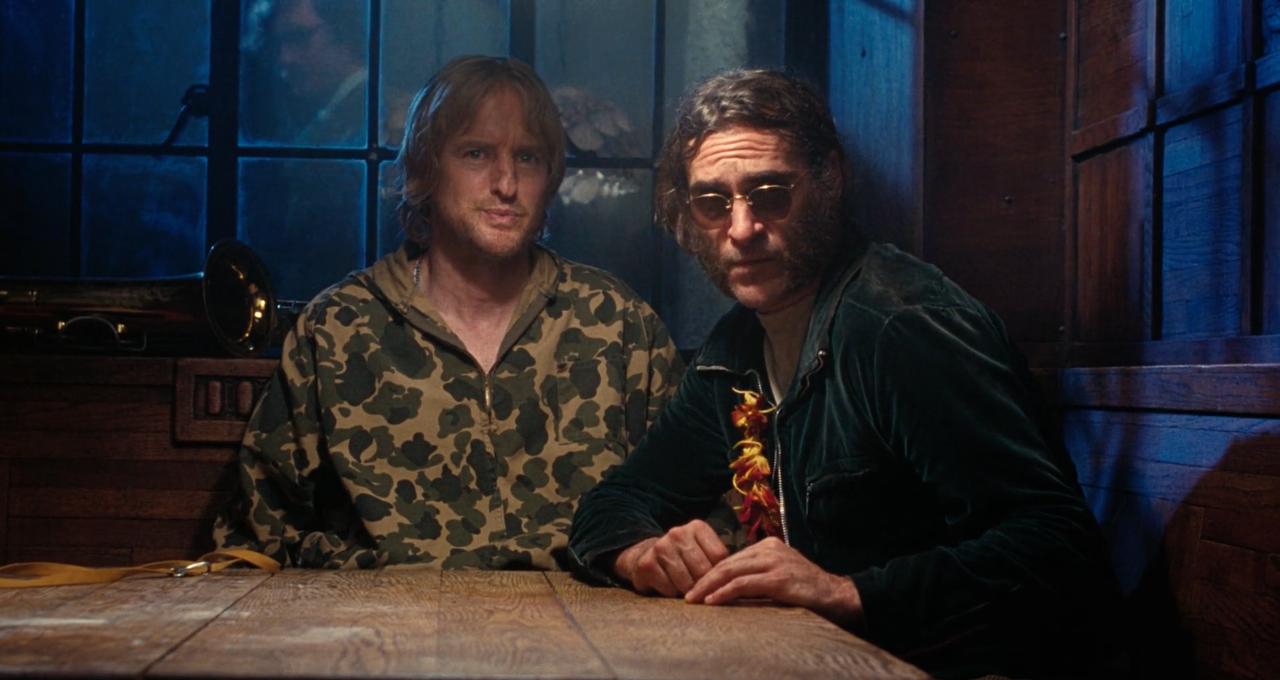
CM: So, you’re a head of a film festival now. How do you sell something like this to a festival crowd? It’s kind of an “eat your vegetables” thing for some people. But on the other hand, like you said, you were surprised that it was funny.
KS: That’s a good question. I think I’d want to highlight that it was a funny and entertaining movie. You also have to be upfront about it too, right? ‘Cause I think you can tell someone it’s entertaining, but they’re probably not expecting two and a half hours. Paul Thomas Anderson’s gotten really good at the slow burn, and this to me was a slow burn, but it was funny, and you still get a little bit of that reward at the end that you get with a lot of his films.
CM: You’re right, it’s got a great ending, an emotional wrap up like Boogie Nights. Are you generally a PTA fan?
KS: Yeah, generally. Ahead of this, I re-watched The Master. My wife had not seen it, so we watched that this past weekend. I hadn’t seen this or Punch-Drunk Love.
CM: A lot of people love that movie, but I am not a fan.

CM: What did you think about Joaquin Phoenix?
KS: I liked Joaquin Phoenix. I think he’s done some great stuff. In The Master, his performance really stuck out to me. That was, I think, a very physical performance. Not to move away from Joaquin, but to go back to this: it’s a period piece, but it’s not obsessed with being a period piece. You feel it in the dialogue, with Manson, paranoia…
CM: The Mansonoid Conspiracy!
KS: This came out around the same time as American Hustle, which is just obsessed with being a period piece. This has none of that feel at all, which I think is great and feels very natural, very contemporary.
CM: There is a lot of subtext about the end of the sixties, and the corruption of the counterculture. Sportello is a total creature of the sixties counterculture, a hippie to the bone. He’s shocked when Shasta shows up, wearing what he calls “flatland gear.” It looks like it’s about a real estate scam, when it starts. That’s basically Chinatown, you know? Then it sort of wanders off from there. Did you feel like you could follow the plot?
KS: Yeah, reasonably so.
CM: That’s good, because I think to a lot of people, it seems like gibberish.
KS: I feel like I could capture it. Maybe I’m being overconfident. That’s definitely why I said I need to rewatch it. I got the commercialization of the counterculture, and especially the real estate part of it. I was not real clear on how we got to Adrian Prussia.
CM: That’s a big plot hole that they hang a lampshade on. The narrator Sortilége says something like “he threw himself onto the karmic wheel.” He’s the guy I haven’t checked out yet. So it’s a very loose connection. But then it turns out to be the key to the whole thing. You know, the basic film noir structure is pretty simple: The detective just goes and bounces off one person after another until he solves the crime. Or not.
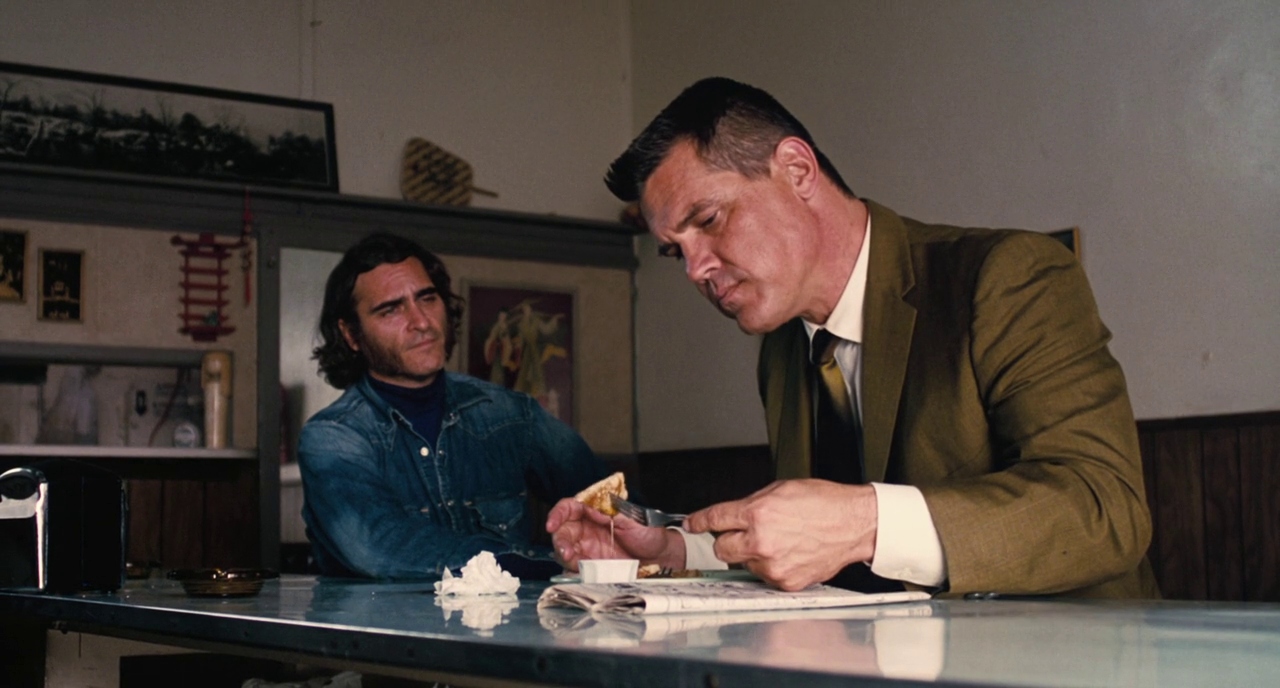
KS: There’s something with Paul Thomas Anderson and male friendships, and it’s in this movie, too. There’s something kind of fun and sweet about it. Sportello and Bigfoot have these dynamics that are established in our society all around us. You’ve got Doc, the hippie, and Bigfoot this sort-of Republican, super buttoned-up man. Yet they’re able to understand each other on a deeper level than just sort of, “Hey, we’re both detectives.” There’s something very sweet about that connection.
CM: Turns out when Sportello finds out that Adrian Prussia killed Bigfoot’s partner for the Golden Fang, he’s like, “Oh my God! I understand this guy now!” He has empathy for him, you know? Then there’s Benicio del Toro, the lawyer, which is another conflicted male friendship. “Clients pay me, Doc. Clients pay me.”
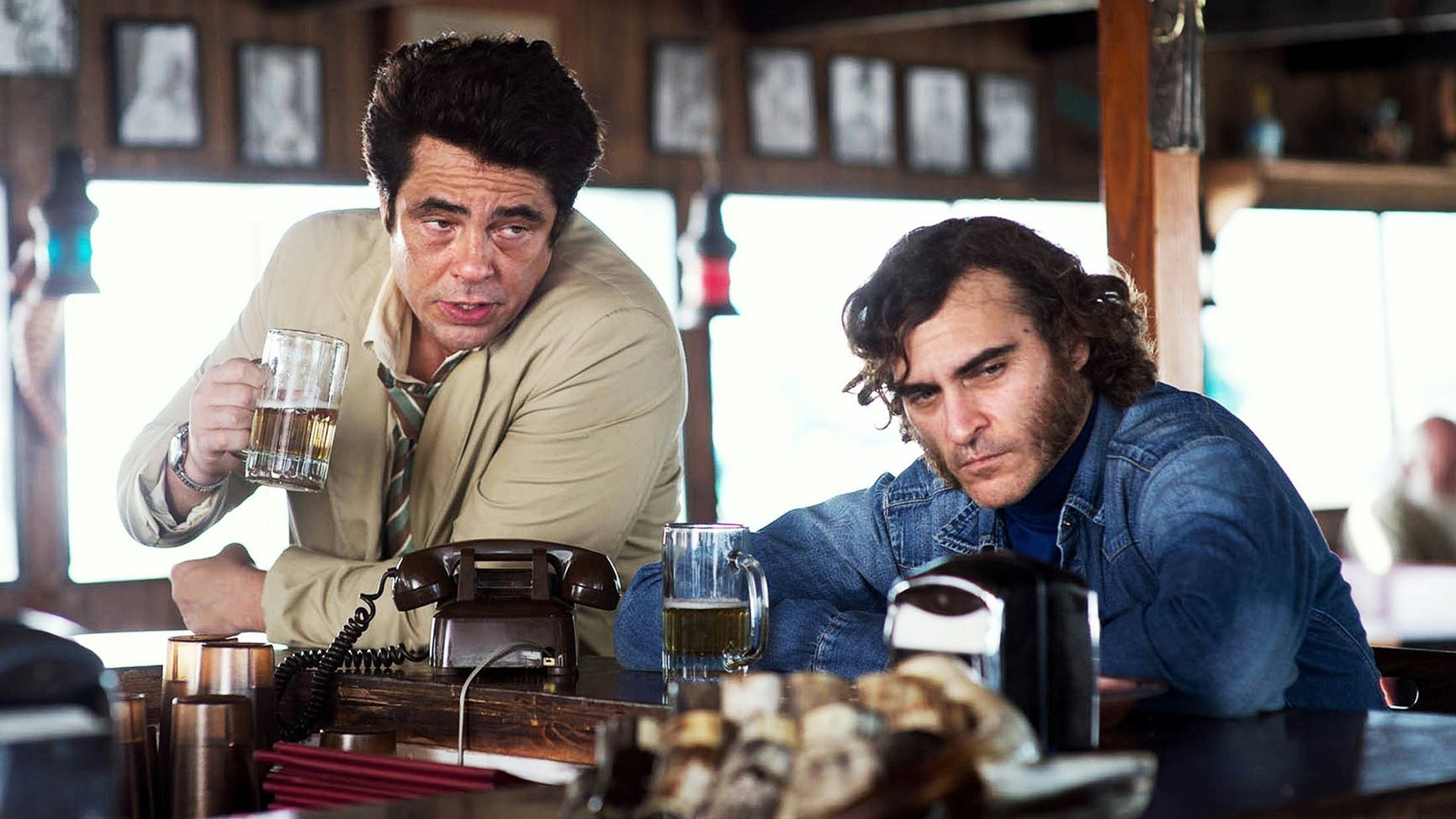
Lemme ask you: Sortilége, the narrator. Do you think she’s a real person?
KS: I mean, no. It’s interesting. He’s using Joanna Newsome, who’s got probably the most otherworldly voice I could imagine, and using her for this character that kind of just floats in and out, and sometimes she doesn’t even have a body. Until you asked the question, I didn’t think about it, though.
CM: Seriously, I had watched it a couple of times until I realized, she’s not actually a person, she’s just in his mind.
KS: Wait, there’s a scene when they’re in the car together, towards the beginning, where she just kind of fades away.
CM: You see them in the car, then the angle reverses, and she’s gone. She’s his internal monologue. And she also fills that film noir voiceover role. You know, “That’s me, floating dead in the pool …”

KS: It’s a very film-y movie without being overly film-y. I think of Boogie Nights, where the opening scene has a very Spielberg feel, like he’s like paying direct homage. He doesn’t do that here. It feels natural.
CM: The cinematography is incredible.
KS: Yeah, all the blues and yellows. I keep thinking of that opening and closing. It’s not quite the closing shot, but the ocean in between those two buildings, it’s a beautiful, beautiful start to a movie. It’s a really gorgeous, gorgeous film. And I heard y’all kind of react to it, at the end when he’s driving with Shasta, and the lights are coming in, right in his eyes. It’s got this sort of dream-like light. It’s almost like they’re floating in the air.
CM: It’s full of these weird dualities, and fascists lurking in the background, like the Jewish builder who hangs around with Nazis. And the bit, “Is that a swastika?” “No, that’s a Hindu symbol of luck.” Nah, it’s a swastika tattooed on that guy’s face!
KS: It goes back to what I was saying about Sportello and Bigfoot — the more liberal hippie Sportello and the very conservative, super buttoned-up cop who were able to get along.
CM: And the Black Panther who comes in and tries to hire Sportello to find out who killed his Aryan Brotherhood friend.
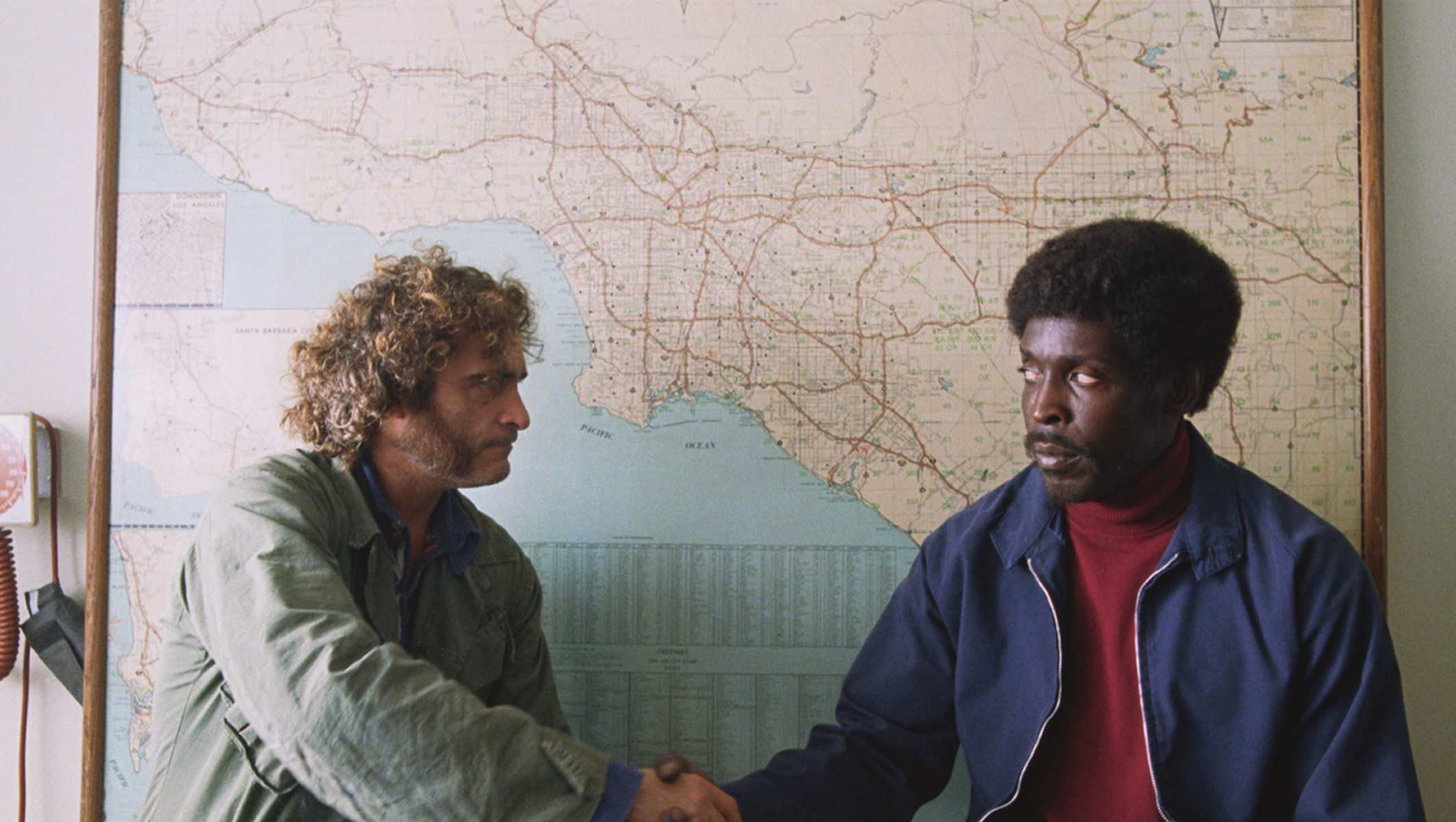
KS: And rest and peace to Michael K. Williams. I did not know he was in this movie. He just passed away.
CM: I didn’t realize that was him! I mean, seriously, the cast is amazing.
KS: Oh yeah. Maya Rudolph is in like, what, two scenes maybe? She’s just the receptionist!
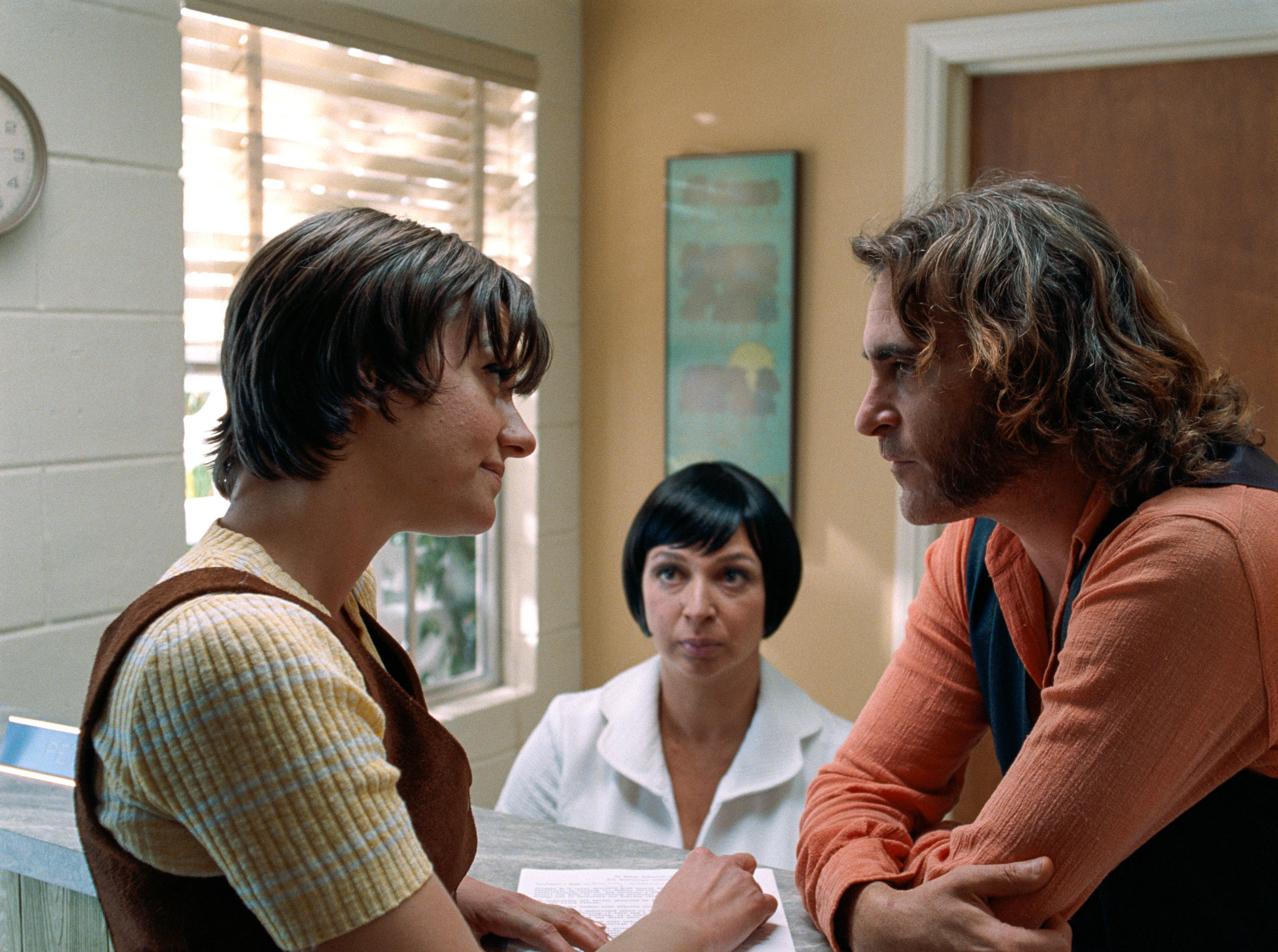
CM: One of the things I like about film noir, and you see it in this movie, too, is that everybody’s playing a game against everybody else, and everybody’s a rational player. Everybody’s looking two or three moves ahead, which allows the dialogue to be very subtle because everybody’s anticipating each other’s moves. That’s one of the things that appeals to me about noir. Everybody’s smart and savvy. But real life is not like that at all. People are stupid. If you expect rational actors, it’ll mess you up. I’m very distrustful of people.
KS: And that’s on steroids in this with all the paranoia that he’s already feeling from the pot.

CM: Sportello doesn’t actually solve anything! He gives the dope back to the Fang and Shasta just comes back on her own.
KS: He helps out Coy, which seems like the most insignificant of all the connections that are made. And you’re like, “Wait, so the end prize is that he gets to go home to his wife and kids? Like, okay, great.”
CM: Maybe that’s what’s challenging about it: This movie’s not holding your hand. It presents all the information, but you gotta put the work in. And to bring us back around to Indie Memphis, maybe that’s what you want out of festival movies. It’s not just passive viewing. Right?
KS: No, absolutely not. I think one of the things that we find really important is that the festival is finding films that do a good job at that in such an entertaining way — this is a really good example — and then making sure that there is a conversation, because films like this deserve a conversation like we’re having here. Whether that be from our local filmmakers, whether that be from national films, they all deserve a really thoughtful conversation. That’s what the festival is really all about — being able to celebrate creative and artistic endeavor and give it the honor that the work deserves through thoughtful conversation and celebrating the artist.
